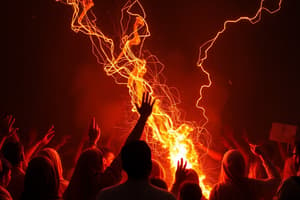Podcast
Questions and Answers
What does culture refer to?
What does culture refer to?
That complex whole which includes knowledge, beliefs, arts, morals, laws, customs and any other capabilities and habits acquired by man as a member of society.
Who defined culture as a complex whole including various elements of society?
Who defined culture as a complex whole including various elements of society?
Edward Tylor
Which of the following is NOT listed as part of culture?
Which of the following is NOT listed as part of culture?
Personal identity remains static throughout a person's life.
Personal identity remains static throughout a person's life.
Signup and view all the answers
What is society according to the document?
What is society according to the document?
Signup and view all the answers
Which of the following describes the significance of studying society?
Which of the following describes the significance of studying society?
Signup and view all the answers
What does anthropology study?
What does anthropology study?
Signup and view all the answers
Political science is an unstructured study of society.
Political science is an unstructured study of society.
Signup and view all the answers
What areas does sociology encompass?
What areas does sociology encompass?
Signup and view all the answers
Match the following disciplines with their definitions:
Match the following disciplines with their definitions:
Signup and view all the answers
Match the following terms with their significance:
Match the following terms with their significance:
Signup and view all the answers
Match the following concepts to their descriptions:
Match the following concepts to their descriptions:
Signup and view all the answers
Match the following elements with their corresponding fields:
Match the following elements with their corresponding fields:
Signup and view all the answers
Match the following keywords with their relevant concepts:
Match the following keywords with their relevant concepts:
Signup and view all the answers
Match the following branches of study with their focuses:
Match the following branches of study with their focuses:
Signup and view all the answers
Match the following aspects with their definitions:
Match the following aspects with their definitions:
Signup and view all the answers
Match the following components of society with their functions:
Match the following components of society with their functions:
Signup and view all the answers
Match the following terms related to culture with their definitions:
Match the following terms related to culture with their definitions:
Signup and view all the answers
Match the following components of culture with their descriptions:
Match the following components of culture with their descriptions:
Signup and view all the answers
Match the following authors with their quotes about culture:
Match the following authors with their quotes about culture:
Signup and view all the answers
Match the following concepts with their related fields:
Match the following concepts with their related fields:
Signup and view all the answers
Match the following elements of personal identity with their characteristics:
Match the following elements of personal identity with their characteristics:
Signup and view all the answers
Match the following key social processes with their functions:
Match the following key social processes with their functions:
Signup and view all the answers
Match the following forms of knowledge with their types:
Match the following forms of knowledge with their types:
Signup and view all the answers
Match the following fundamental aspects of society with their descriptions:
Match the following fundamental aspects of society with their descriptions:
Signup and view all the answers
Study Notes
Understanding Culture, Society, and Politics
- Change is constant, as highlighted by Heraclitus' quote, "Change is the only permanent thing in this world."
Culture
- Defined as a complex whole that encompasses knowledge, beliefs, arts, morals, laws, customs, and habits acquired by individuals in society (Edward Tylor).
- Key components of culture include:
- Knowledge: Information and understanding people acquire.
- Morals: Principles distinguishing right from wrong.
- Beliefs: Convictions or acceptance that something is true.
- Customs: Established social practices.
- Arts: Creative expressions through various forms.
- Culture is significant for:
- Adaptation and integration within societies.
- Establishing patterns of socially acceptable behavior.
- Conveying and facilitating meaning.
- Producing man-made goods and human satisfaction.
Personal Identity
- Personal identity evolves throughout life, shaped by experiences and social interactions.
Society
- Society is created through human social processes aimed at fulfilling basic survival needs.
- Represents individual identity and the totality of a territory.
- Symbolizes political independence and provides avenues for economic interdependence.
Politics
- Politics often associated with power, but encompasses:
- Consensus and compromise.
- The study of public affairs and governance.
- Distribution of power and resources within society.
Anthropology
- Anthropology studies humans, their works, bodies, behaviors, and values, derived from Greek terms "anthropos" (man) and "logos" (study).
Political Science
- Political science systematically studies states and governments, adjusting to relationships among community members.
- Focuses on the knowledge, competence, and skills necessary to engage in political processes.
Sociology
- Sociology systematically examines human society and social behavior at all levels, from large institutions to individual interactions.
- Studies various aspects of social life, including:
- Social relationships.
- Social organization.
- Social structures and processes.
Understanding Culture, Society, and Politics
- Change is constant, as highlighted by Heraclitus' quote, "Change is the only permanent thing in this world."
Culture
- Defined as a complex whole that encompasses knowledge, beliefs, arts, morals, laws, customs, and habits acquired by individuals in society (Edward Tylor).
- Key components of culture include:
- Knowledge: Information and understanding people acquire.
- Morals: Principles distinguishing right from wrong.
- Beliefs: Convictions or acceptance that something is true.
- Customs: Established social practices.
- Arts: Creative expressions through various forms.
- Culture is significant for:
- Adaptation and integration within societies.
- Establishing patterns of socially acceptable behavior.
- Conveying and facilitating meaning.
- Producing man-made goods and human satisfaction.
Personal Identity
- Personal identity evolves throughout life, shaped by experiences and social interactions.
Society
- Society is created through human social processes aimed at fulfilling basic survival needs.
- Represents individual identity and the totality of a territory.
- Symbolizes political independence and provides avenues for economic interdependence.
Politics
- Politics often associated with power, but encompasses:
- Consensus and compromise.
- The study of public affairs and governance.
- Distribution of power and resources within society.
Anthropology
- Anthropology studies humans, their works, bodies, behaviors, and values, derived from Greek terms "anthropos" (man) and "logos" (study).
Political Science
- Political science systematically studies states and governments, adjusting to relationships among community members.
- Focuses on the knowledge, competence, and skills necessary to engage in political processes.
Sociology
- Sociology systematically examines human society and social behavior at all levels, from large institutions to individual interactions.
- Studies various aspects of social life, including:
- Social relationships.
- Social organization.
- Social structures and processes.
Studying That Suits You
Use AI to generate personalized quizzes and flashcards to suit your learning preferences.
Related Documents
Description
This quiz explores the fundamental concepts of culture, society, and politics. It delves into how these elements interact and influence each other in the modern world. Reflect on the insights of philosophers like Heraclitus as you consider the notion that change is a constant force in our lives.




